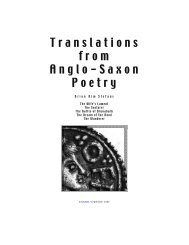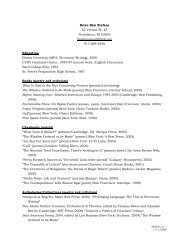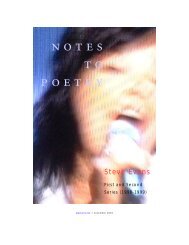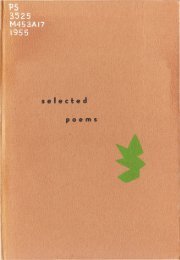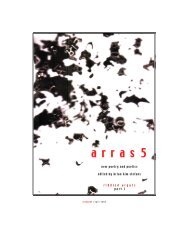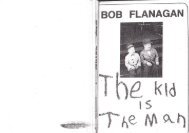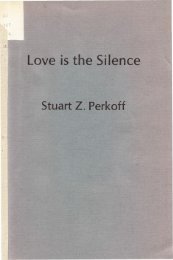new poetry and poetics edited by brian kim stefans - Arras.net
new poetry and poetics edited by brian kim stefans - Arras.net
new poetry and poetics edited by brian kim stefans - Arras.net
Create successful ePaper yourself
Turn your PDF publications into a flip-book with our unique Google optimized e-Paper software.
BKS: From my various communings either in person or electronically with writers<br />
from Engl<strong>and</strong>, it appears that few are very excited about the alternative <strong>poetry</strong><br />
scene over there, complaining of a lack of discourse, venues for presenting<br />
one’s work or experiencing other’s, <strong>and</strong> the general disinterest in experimental<br />
<strong>poetics</strong>. Tom Raworth is often proposed as the only one from the older generation<br />
worth looking at, a position he has held, it seems, since the early eighties<br />
when he was one of the few English writers American poets found innovative <strong>and</strong><br />
challenging. (J.H Prynne <strong>and</strong> Ian Hamilton Finlay each have their cult audiences,<br />
but neither seems to have gained much of a presence, here). “Conductors<br />
of Chaos” seemed to offer some very “alternative” style <strong>poetics</strong>, <strong>and</strong> to “rediscover”<br />
some lost poets of generations past, but despite the various figures that could<br />
be deemed forebears to a radical contemporary praxis, none seem to spark excitement<br />
in quite the way that the Objectivist poets <strong>and</strong> figures like Jackson Mac<br />
Low or Gertrude Stein, for example, did for the Language Poets. I always wondered<br />
why writers like David Jones <strong>and</strong> Basil Bunting never produced much of<br />
a “lineage” that could extend from their example (very different type of “experimental”<br />
<strong>poetry</strong>, obviously).<br />
Do you feel that, in general, writers of an “alternative” bent in Engl<strong>and</strong> tend not<br />
to affix themselves to “lineages” the way some American poets (addicts) do? Is<br />
the “heroic” aspect of formal discovery <strong>and</strong> thematic innovation just not an element<br />
in English literary culture (perhaps as a reaction to an American ethic<br />
itself)? Do you feel part of a lineage – or, more importantly, do you feel there is<br />
a sense among other poets your age that such an attempt to find something in<br />
English modernism that can be developed – rather than honored yet isolated as<br />
a freak occurrence – is important? Who do you look at in Engl<strong>and</strong> (<strong>and</strong> who do<br />
you wish would just write better)?<br />
MC: I suppose the first thing that comes to mind to say is that, as you know, I<br />
have a fair idea of which English poets (or poets resident in Engl<strong>and</strong>) you are in<br />
touch with, &, well, they simply are writers who, at least as I underst<strong>and</strong> it/them,<br />
have what might best be described as mixed feelings about the current scene here.<br />
A different sampling of poets would paint a very different picture–that things<br />
have never been better, for instance.<br />
I think a sense of lineage of some sort is quite prevalent among some “alterna-



